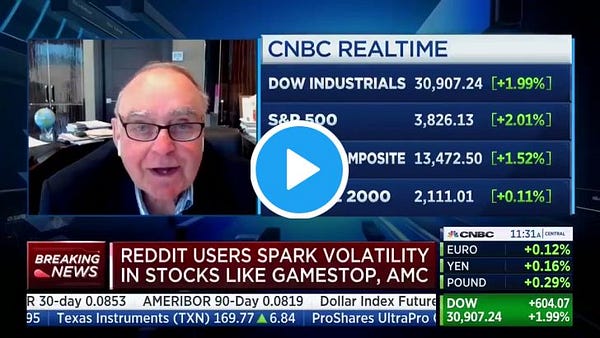Put away the pitchforks, we have meme stocks now
Welcome to “Not Pretty, Not Rich,” a newsletter about money and the economy.
It’s Friday, February 5, 2021, and here’s this week’s rundown:
News recap
Fancy words: “Shorting”
A GameStop saga post-mortem
Numbers and links
Quick note: I didn’t have the bandwidth to write the newsletter last week. And, of course, that just happened to coincide with some of the craziest market stuff we’ve seen in quite some time. We’ll address some of that in this issue.
News recap
Market revolt: You’ve probably heard, but there was a bit of drama on the stock market over the past couple of weeks. We’ll talk about it.
Biden’s stimulus plans: The new administration wants to push through another big stimulus package ($1.9 trillion in all), and it probably will. But the details are still being worked out, but it sounds like it’ll include $1,400 stimulus checks.
Looking up? The CBO says the economy should drastically improve this year, but it’ll still years for a full recovery from the pandemic.
Fancy words and what they mean: “Shorting”
You’ve seen it in all the headlines! This is what it means.
Shorting! You’ve likely heard it discussed with GameStop stock and all the other craziness in the markets. It’s also central to the movie/book “The Big Short” — which, if you’ve never read/seen, you should!
But what does it mean, exactly?
In the simplest terms, to “short” something means to bet against something. So, if you were to short a stock, you’d be making a bet that the stock will decline in value.
Then, you’d take investing positions to take advantage of that decline. For example, shorting a stock would require you to “borrow” shares, sell them at market price, and then repurchase them at a lower price. It’s kind of complicated, but you can read more about it: The Balance has a pretty good explainer, as does Fidelity.
But for me, I’ve always associated a “short” position as a bet that something will lose value. Conversely, a “long” position would be the opposite — it’ll gain value.
A GameStop saga post-mortem
Okay, seriously, why would anyone invest in GameStop? Its business model is outdated, it could easily be overtaken by competing retailers at any time, and there’s no clear path forward for it.
When you think about it, that makes a pretty compelling case for betting against (or shorting!) the company. That’s exactly what’s at the center of the GameStop saga — professional investors (not the Reddit people) were shorting GameStop. They were betting against it.
It’s a long story. But the short is that those that were shorting GameStop (many hedge funds, etc.) essentially lost their bet, when a bunch of amateur investors (which organized on a subreddit called r/wallstreetbets) starting buying the stock, pushing prices HIGHER.
The story goes much deeper, too, including problems with stock trading platforms (like Robinhood).
NBC News has a solid explainer, as does the Associated Press, if you want a bigger breakdown. But when it was all said and done, this is what happened to GameStock’s share price:
Some people made a lot of money. Some people, who got caught up in the hype and bought GME at $300, are going to get burned (this is why they tell you not to let your emotions interfere with your finances!). And so it goes.
So, fast forward, a bunch of hedge funds and others end up losing money because they made a losing bet. Their shorts got squeezed. That caused a lot of anger at the people on Reddit for “manipulating the markets.”
Essentially, the market manipulators lost at their own game, and are mad about it. Here’s Jim Cramer explaining how these hedge funds manipulate the markets from 15 years ago:
This time, though, a bunch of barbarians crashed the gates and, in a sense, beat them at their own game. It made some people, like billionaire hedge fund manager Leon Cooperman, very upset:
Yes, meme stocks are an “attack on wealthy people.”
He continued: “The reason the market is doing what it’s doing is, people are sitting at home, getting their checks from the government, basically trading for no commissions and no interest rates,” he said.
Hmm…a bunch of people gambling away money, with help from the government…sounds familiar.
Guys like this will go on TV and say that we need to come together and help each other and blah blah blah, but remember, too, that these are the types of people who dumped McDonald’s applications on Occupy Wall Street protestors.
So, how should we think about the GameStop saga?
To me, this is all kind of like playing poker. When you have a big stack of chips, you can push people around — call out lousy bets, play a bad hand just for fun, etc. Because, if you lose, you still have a massive amount of chips left.
But when you’re playing with a short stack, you have to be much more cunning, focused, and specific about how you play. One wrong move and you bust out. That’s generally why hedge funds and others with a lot of capital can dabble in shorting and trading derivatives — if they lose their bets, they can still pay rent.
If I, though, were to have taken every resource I had at my disposal and bought a bunch of GameStop stock at $300, because the people on the internet told me it was going to $1,000? It’d be an ugly situation.
Again, this is probably why it’s wise to sit these types of things out, especially if you don’t have the money to lose, and don’t understand what you’re doing. It’ll happen again — the same crowd targeted other stocks in addition to GameStop, like AMC, and even tried to pump up silver prices, too. Unfortunately for me (if you read my previous newsletter), I don’t have all that much silver :(
The point is this: There are a lot of people and institutions that are engaged in some complicated jiggery-pokery (shout out to Justice Scalia) on the markets. They largely get away with it because it is so complicated — few people can understand what’s going on, so they don’t care.
But now, more of us not only have access to the knowledge and know-how, but we have the tools to organize and execute the same trades that can move the markets. And now, the people who are used to winning are experiencing some losses, and they aren’t happy about it.
The whole thing reminds me of this scene featuring my boy Bane:
I may not even have a salient point to this whole diatribe, but I do think it’s important to look at the bigger picture here. Obviously, hedge funds and big institutional players are now aware that the normies have found some sort of power on the markets. I’m not sure if that will change anything (or what it could change), but it’s a new development.
And while it’s easy to get caught up in the hype, remember that putting a bunch of money into a meme stock is very risky. That’s why r/wallstreetbets is all about betting — the whole point is that they’re engaging in risky, and often ill-advised, behavior.
It’s kind of like how Qanon was sort of a joke until a bunch of people started taking it seriously.
So, sure, laugh and shake your head at the whining billionaires who end up losing a few bucks. Remember, too, that there are some others that cleaned up.
Just don’t expect stocks like GameStop to make you rich.
Numbers and links
2035: When General Motors plans to stop selling gas-powered vehicles (CNN)
19 years: A young man’s two-decade-long bet on GameStop pays off (BNet)
$1 trillion: Is it enough to cure all diseases? (The Guardian)
€555,237,619: The value of Lionel Messi’s four-year contract with Barcelona, worth roughly $667,634,000 USD (Yahoo! Sports)
BlackRock CEO Larry Fink published his annual letter to CEOs recently. Last year, he talked up ESG investing (and it had an impact). This year, he’s doubling down. It’s worth reading.
See you next week!
“Not Pretty, Not Rich” is a newsletter about money, finance, and the economy. You can connect with me through my website, Twitter, LinkedIn, or send me an email at sammbecker@gmail.com. Also, if you enjoy this newsletter, I’d really appreciate it if you would share or forward it to others.
And remember, the contents of this newsletter are not meant to be taken as advice. It’s informational and entertainment only.







